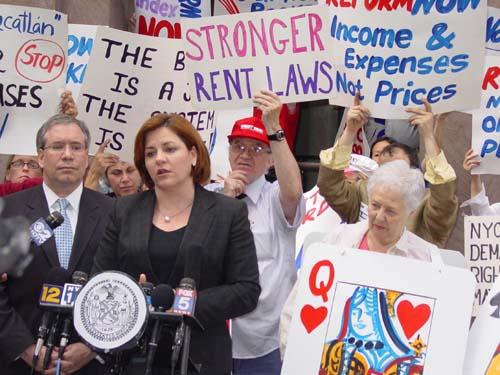Amid the hoots and ear-piercing whistles that echoed throughout the Great Hall at Cooper Union’s vaulted ceilings, the Rent Guidelines Board (RGB) voted 5 to 4 to increase rents by 4.5 percent and 8.5 percent for the city’s rent-stabilized tenants renewing one- and two-year leases, respectively
“It’s unfortunately not a surprise that the public members voted for it and the tenant members against it,” said Elana Shneyer, Lead Organizer at the Pratt Area Community Council. “The increases are the highest they have been since 1989 and they target long-term, low-income paying tenants. People’s incomes are not increasing by 4.5 and 8.5 percent next year.”
After a short recess an hour into the hearing, the Board voted for the percentage increases and a new supplemental increase from tenants if the tenant has lived in the rent-stabilized building for more than six years. Owners can choose either the percentage increase the RGB voted on or a flat increase of $45 a month for one-year leases or $85 a month for two-year leases, depending on which is higher. The ruling is effective on Oct. 1, 2008.
Tenant organizations and housing advocacy groups reacted with dismay to the news, chastising the RGB for introducing the supplemental increase the morning their decision was made without putting it up for discussion at public hearings in May and early June.
“It’s extremely frustrating for those of us who have been fighting for months to get the lowest possible increase to get hit with this,” said Maggie Russell-Ciardi, executive director of Tenants and Neighbors, a statewide tenant advocacy and organizing group. “We’re particularly concerned about the supplemental increase.”
Owner groups were pleased with the increase, claiming it would offset higher costs for oil, property taxes, assessments and water. Aaron Sirulnick, a member of the Rent Stabilization Association, an owner’s group of rent-stabilized buildings, and owner of several properties in Brooklyn, criticized the proceedings as ineffective and urging the city to develop a better way to negotiate with tenants over the operation of affordable housing.
“Tenant groups have to recognize that we’re running a business with real costs,” Sirulnick said. “These costs don’t go down no matter how hard these whistles blow.”
Councilmembers vowed to reform the Rent Guidelines Board and develop programs to prevent landlords with excessive building violations from receiving rent increases.
“Councilmember Diana Reyna is incredibly disheartened by their decision, although it wasn’t surprising,” said Loren George, chief of staff to Reyna. “It’s true that water, oil, and maintenance costs for landlords are increasing but milk, gasoline, and other basic costs are going up for thousands of tenants living at the margins.”
In the coming months, councilmembers will be exploring ways of creating a rent increase exemption program for working families, similar to the Senior Citizens Rent Increase Exemption (SCRIE) program. City Council staff members speculated that the Council could initiate a program next year, after they research specific criteria to include within it.
Meanwhile, as food, medicine, and energy prices continue to escalate, rent-stabilized tenants will be making a host of difficult choices over the coming year. Some may even have to choose to leave the city.
“What we’re risking is the diversity of our community,” George said. “We can’t allow the city to become an enclave only for the wealthy. Not only will we lose the cultural identity of the city to make it great, people will be coming in from further and further away to perform basic services to keep our city running.”






















